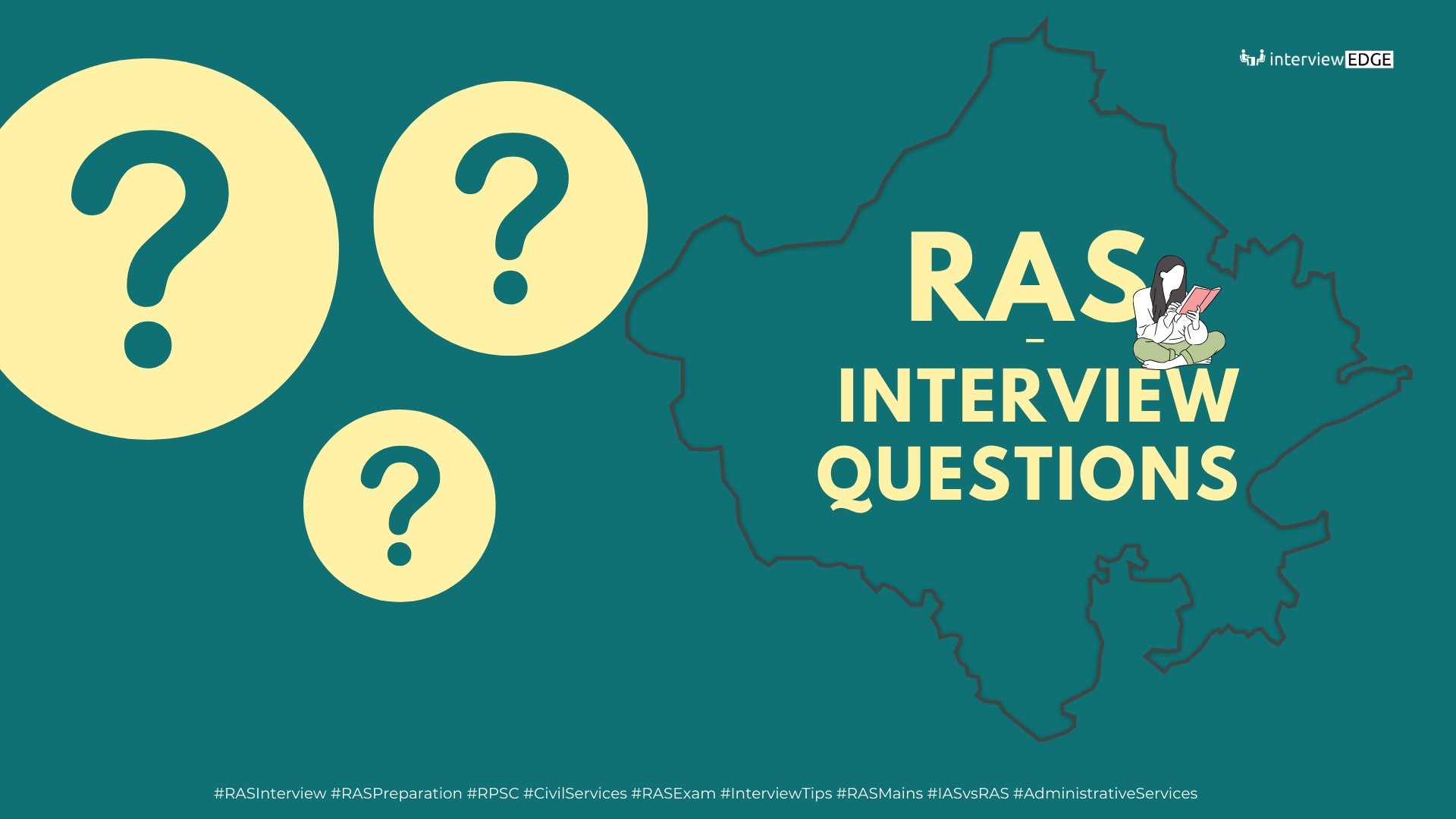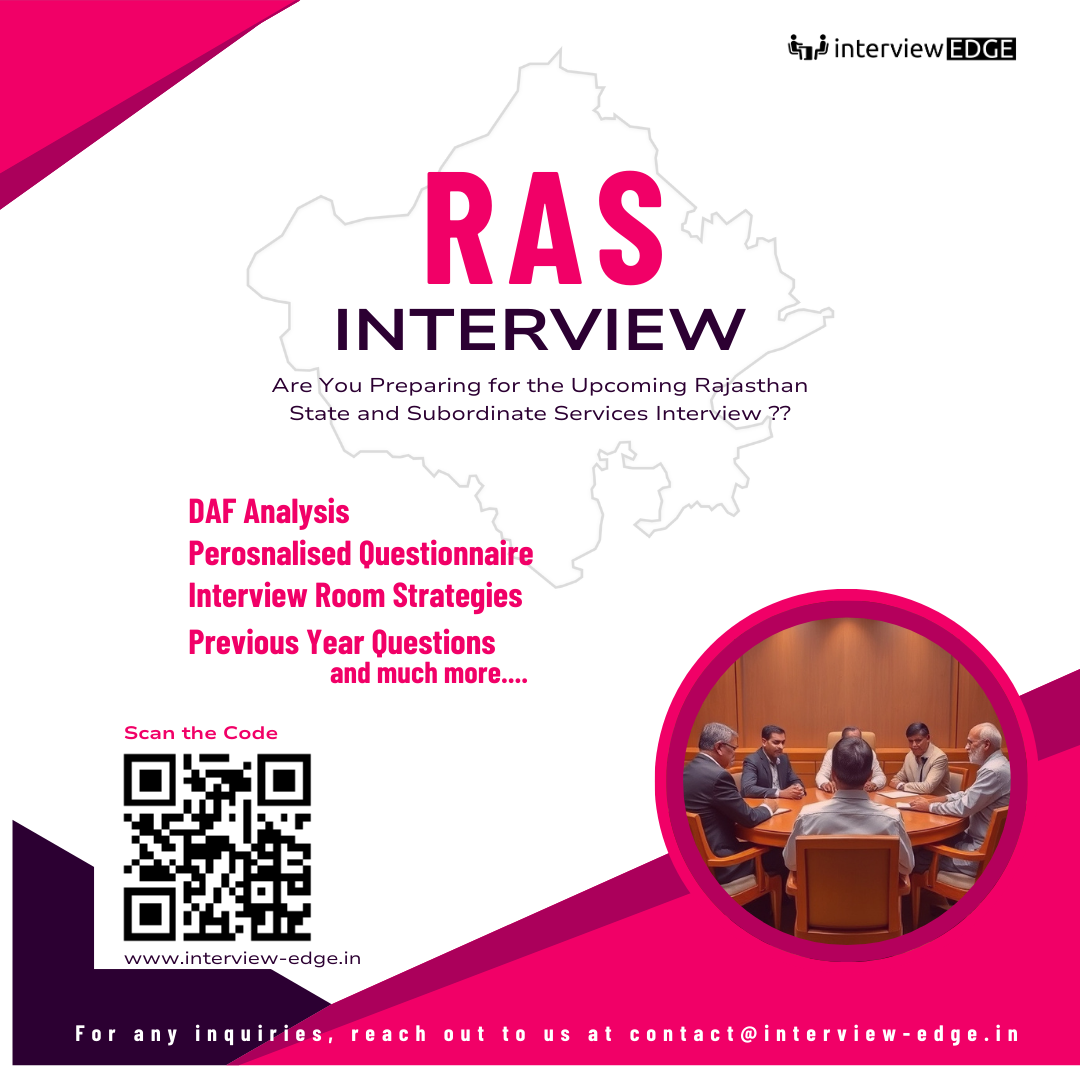
As we all know, the Rajasthan Administrative Service (RAS) exam is taken by lakhs of aspirants who clear the prelims and mains to reach the crucial interview stage. Unlike UPSC, where optional subjects create a significant difference in mains marks, RAS has common subjects and papers for all candidates. This results in a relatively smaller difference in mains scores, making the interview stage pivotal for gaining an EDGE over others.
Multidimensional Nature of the Interview
The RAS interview covers a wide range of topics that assess a candidate’s overall understanding, analytical skills, awareness of current affairs, and suitability for an administrative role.
To begin with, a strong foundation in Rajasthan’s rich history and cultural heritage is essential, as these topics often form the core of interview discussions.
Rajasthan’s History and Culture
Historical significance, forts, temples, and traditions.
- How did Rajasthan get its name? What does it signify?
- What are some unique aspects of Rajasthan’s culture that set it apart from other states?
- Which are the most historically significant battles fought in Rajasthan?
- What is the Rajputana tradition? How does it align with modern values?
- Which royal families continue to hold cultural significance today?
- What is the historical significance of Mewar, Marwar, and Dhundhar regions?
- How has Rajasthan’s folk music and dance contributed to India’s cultural identity?
- What are the different architectural styles seen in Rajasthani temples and forts?
- Why is the term ‘Sawai’ used before the names of kings in Rajasthan?
- What are some GI-tagged handicrafts of Rajasthan?
While historical knowledge is crucial, a deep understanding of Rajasthan’s geography and socio-economic challenges is equally important for an administrative role.
Geography and Socio-Economic Issues
Impact of the Thar Desert, water scarcity, and regional disparities.
- What are the major geographical regions of Rajasthan?
- How does the Aravalli Range impact the climate and economy of Rajasthan?
- Which regions in Rajasthan are most prone to severe heatwaves?
- What is the reason behind Jaipur and other cities facing urban flooding despite being a dry state?
- What are the primary sources of irrigation in Rajasthan?
- Which are the worst-affected districts for fluoride contamination in drinking water?
- What are some initiatives taken by the government to tackle the water crisis?
- How has desertification affected agricultural output in western Rajasthan?
- What is the significance of the Indira Gandhi Canal?
- How does Rajasthan’s geography impact industrial development?
- How does the state’s international border with Pakistan influence security concerns and trade?
Beyond geography and social concerns, governance remains a key area where aspirants must demonstrate their grasp of policies and administrative mechanisms.
Governance and Administration
Policies, revenue sources, and digital penetration.
- What are the three primary sources of revenue for Rajasthan?
- What administrative measures have been taken to improve law and order?
- How has digital penetration improved governance in Rajasthan?
- What is the status of the Panchayati Raj Institutions in the state?
- What steps have been taken to address unemployment in Rajasthan?
- How has the Bhamashah scheme impacted financial inclusion?
- What is the Community Kitchen (Indira Rasoi) initiative?
- What is the ‘Viksit Rajasthan@2047’ vision plan?
- What was the reason for the bifurcation and unification of the three municipal corporations?
A successful administrator must also be well-versed in maintaining law and order, addressing crime rates, and tackling social unrest.
Law and Order
Crime rates, communal issues, and social concerns.
- What is the current law and order situation in Rajasthan?
- Why has communal violence been on the rise in certain regions?
- What does the latest NCRB data say about crime in the state?
- What was the controversy regarding the protection law for government officials in Rajasthan?
- What is being done to improve women’s safety in the state?
Finally, a thorough awareness of Rajasthan’s political landscape and administrative frameworks is essential, as these elements directly impact governance.
Political and Administrative Aspects
Election trends, regional governance, and policy-making.
- Why does Rajasthan elect alternate governments every assembly election?
- What is the status of the Bhil Pradesh demand?
- How does the delimitation exercise impact Rajasthan’s Lok Sabha seats?
- What were the reasons behind the cancellation of the RPSC exam?
Get Your Personalized Questionnaire
The RAS interview is not just a test of knowledge but an assessment of a candidate’s personality, decision-making ability, and administrative potential. It covers a broad spectrum of topics, including Rajasthan’s history, geography, economy, governance, law and order, agriculture, tourism, and more. Additionally, candidates must be prepared for ethical dilemmas, behavioral questions, name-based queries, and discussions on national and international current affairs.

Since the interview plays a crucial role in determining final ranks, a well-structured preparation strategy is essential. To streamline your preparation and save time, get a personalized questionnaire covering all relevant topics—ensuring you approach the interview with clarity and confidence.
Also Read :
-
Understand the Difference: Read how UPSC and State Civil Services interviews differ.
- Practice with PYQs: Access previous years’ interview questions, including UPSC Interview PYQs.
